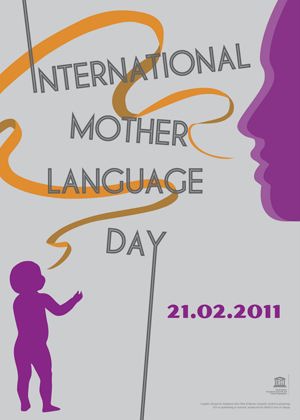How are you, mother tongue?
Anti-cultural environment is discomfortable for any language
On February 21, 1952, the Bangladeshi (then known as East Pakistan) government shot and killed students protesting against the lack of recognition of Bengali, the language of a majority of the country’s citizens. This was part of the then East Pakistan’s struggle against the domination of the Urdu language (the language of West Pakistan). This date marks a celebration in Bangladesh for those who perished in defense of their native language. Based on a UNESCO decision in 1999, this day is now celebrated throughout the world as the International Mother Language Day. Since 2000 the Mother Language Day has been marked in Ukraine, too.
In our country different nationalities speak dozens of languages. According to the All-Ukrainian Census of 2001, Ukrainian is the native language of 67.5 percent of Ukraine’s citizens. In addition, Ukrainian is spoken in at least thirty countries around the world. The question of what language to speak, think and write in is an individual’s choice in free countries. And yet in Ukraine this year the Mother Language Day is celebrated in an atmosphere of unprecedented politicization and social discomfort.
The citizens of our country’s eastern regions who consider Ukrainian to be their native language are often deprived of their right to their own language, and the already rare Ukrainian schools in those regions are being closed one by one. Whole sections addressing Ukrainian culture, and hence language, are deleted from Ukrainian literature curricula. Ukrainian book publishing is struggling. The Ukrainians in Russia are pressured by the government, which tries to stamp out their cultural life. All this happens against a background of negligence for the Ukrainian language by the country’s top officials.
In an interview with Radio Liberty the people’s deputy Vitalii Zablots-ky admitted that the cases of closing Ukrainian schools were limiting the freedom of choice. “One should absolutely put such tendencies to an end and keep Ukrainian schools,” Zablo-tsky said. No wonder, since there are many Ukrainians in the Party of Regions who are proud that Ukrainian is their native language. But for some reason Ukrainophobic motifs continue to dominate in the government.
Certainly, on Mother Language Day it would be appropriate to speak about the languages of national minorities residing on the territory of Ukraine and having their own problems with schools, books and cultural centers. But will we be able to protect languages of other nationalities if we cannot protect the state language from dirty politics, careless surzhyk and cultural hegemony of the neighboring nation?
Before February 21 famous Ukrainian writers addressed their compatriots with an appeal not to be passive and protect the Ukrainian language. “The country is separated not by language, Ukrainian or Russian, the country is separated by the provocative and aggressive Ukrainophobic policy of the government, which uses the old ‘divide and rule’ to try to distract people’s attention from their own economic and diplomatic failures,” the appeal states. It makes sense.
Newspaper output №:
№11, (2011)Section
Day After Day





